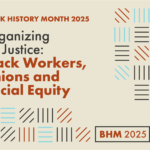
Canada’s unions continue to challenge racism, xenophobia and discrimination
- Addressing systemic discrimination of all forms, including stopping anti-Black racism and Islamophobia;
- Reconciliation and nation-to-nation relationship building with First Nations;
- Launching an inquiry into the overrepresentation of Black and Indigenous children and youth in the care of child protection services; and
- Reforming the criminal justice system, with a shift to restorative justice, and addressing the disproportionate number of incarcerated Black and Indigenous people.
“Recent high-profile cases underscore the urgent need to address the systemic discrimination that is woven into the fabric of multiple Canadian institutions. Systemic failures can have life-or-death consequences,” said Yussuff.
Twenty-two-year-old Colten Boushie from the Cree Red Pheasant First Nation of Saskatchewan was shot and killed in the summer of 2016. Boushie’s family spoke publicly about the mistreatment they received from law enforcement when they were informed of his killing. The accused was acquitted of all charges in Boushie’s death, and experts have indicated that the lack of diversity on the all-white jury played a significant role in the acquittal.
The body of Tina Fontaine, a 15-year-old Anishinaabe girl from Sagkeeng First Nation, was found discarded in the Red River in Winnipeg. She was in contact with child protection, law enforcement and medical professionals in the weeks leading to her disappearance and death. Fontaine’s case is one of many examples of systemic failures and helped prompt the National Inquiry into Missing and Murdered Indigenous Women and Girls.
Abdoul Abdi, a young Somali refugee who was brought to Canada as a child has been failed by a system not designed to support him. Upon his arrival in Canada at the age of six, Abdi was removed from his family and ended up being moved between 31 group and foster homes where he faced psychological and physical abuse. He ended up in trouble with the law and serving a four-and-a-half-year sentence. Once released, he learned he would face deportation because the Nova Scotia government failed to fulfill its responsibility to secure his citizenship while he was in their ward. His deportation hearing has been scheduled for March 21 which is – ironically – the International Day for the Elimination of Racial Discrimination.
“These cases and so many more demonstrate why we must do more to end systemic racism, xenophobia and discrimination at home and around the world,” said Yussuff.





